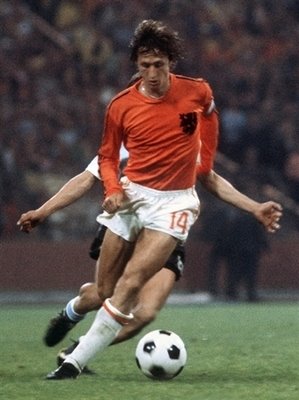Total Football and why it is so hard to play
The World Cup is in full swing and many of the top HR bloggers like Kris Dunn and Paul Hebert have shared some insights on how aspects of the World Cup experience relate back to HR and workplace issues. Heck, even the HR Happy Hour show this week is doing a special 'World Cup' themed episode.
When the World Cup comes around I usually look for a few teams to support, aside from the USA (who usually crash out relatively early), and one of the sides that has always been a favorite is Holland (or the Netherlands). Getting past the relatively minor annoyance of never actually knowing what to call them - is there a difference between 'Holland' and 'The Netherlands' - they are almost always a competitive side, that plays interesting and attacking soccer/football. Johan Cruyff
Johan Cruyff
The Netherlands have a rich legacy of football success, mainly stemming from the concept of 'Total Football', a style or rather a philosophy of football popularized by the legendary Ajax Amsterdam teams of the early 1970's that was then revolutionary.
From Wikipedia:
In Total Football, a player who moves out of his position is replaced by another from his team, thus retaining the team's intended organizational structure. In this fluid system, no player is fixed in his nominal role; anyone can be successively an attacker, a midfielder and a defender. The only player fixed in his nominal position is the goalkeeper.
Total Football's tactical success depends largely on the adaptability of each footballer within the team, in particular his ability to quickly switch positions depending on the on-field situation. The theory requires players to be comfortable in multiple positions; hence, it places high technical and physical demands on them.
Total Football produced some remarkable results for the Ajax club, as well as spurring a the national side to the World Cup final in 1974 where they were ultimately defeated by West Germany, 2-1.
The requirements and the philosophical attributes necessary for success at 'Total Football' have resonance today, reflected in the demands that the modern business environment that places on organizations and individuals.
Creativity
Developing such an innovative style of play required a level of creativity from the manager as well as the players. Devising such a system meant forgetting the traditional methods and the 'that is the way we have always played' mentality that is common, particularly in leaders and organizations that have had success in the past. To succeed the system required looking forward not backward. Organizations and leaders often fail to adequately break free from these restraints, and more openly embrace entirely new ways of working and leading.
Adaptability
Total Football required not only skilled and capable players, but ones that had adaptable skills. Since at any time in the match a player could move forward into an offensive role, control play in the midfield, or retreat to a defensive position, the system hinged on a set of players with adequate skills in what are traditionally discrete and differentiated roles. From relatively early in a player's career they are labeled a 'defender' or 'striker'. The label does focus them for sure, but it also limits them on the field, and for a certain kind of innovative and creative player may also limit their potential. I think organizations often do the same with employees, (and too many employees allow it), getting labeled into one particular role, and not being afforded the opportunity to adapt, to extend or stretch themselves into new areas or disciplines.
Trust
In Total Football the manager has to let go of the ideas of traditional control and strict direction to the players of how to play and where on the field to position themselves. The system developed organically and collaboratively, it was not down to manager to make every decision. The manager has to trust that the players have the right set of skills, capability, and understanding of the mission, but after that he must trust that they will perform on the fields. And the players must trust each other as well. In the scheme if one player vacates a defensive position to move forward in attack, another player will need to adjust and make sure the overall team defensive responsibilities are met. Each player is not just responsible for their small set of tasks or ground to cover, they each individually and collectively are accountable for the overall success of the team, winning becomes the shared and only important objective.
Conclusion
Total Football enjoyed a successful spell in the 1970s in the Netherlands and in the Ajax club, but has largely faded from modern football in the ensuing years. Why? It is a hard system to master, requires looking at problems in new ways, demands the most talented players, with leaders that are not afraid to change the status quo, and a level of trust and commitment between management and players, and among players that is very hard to develop.
The same reasons that hardly anyone plays Total Football anymore are seen in organizations as well. It is hard to forget the 'way we have always done it' mindset. It is easy to slot talent in roles, coach them to high performance in those roles, and leave them there for ages. It is hard for leaders to set a general philosophy and broad parameters of strategy, and them step back to allow employees to exercise their own creativity and judgment.
I wish someone still played Total Football on a high level. Trust me, it would drown out the sounds of the Vuvuzelas.

 Steve
Steve
